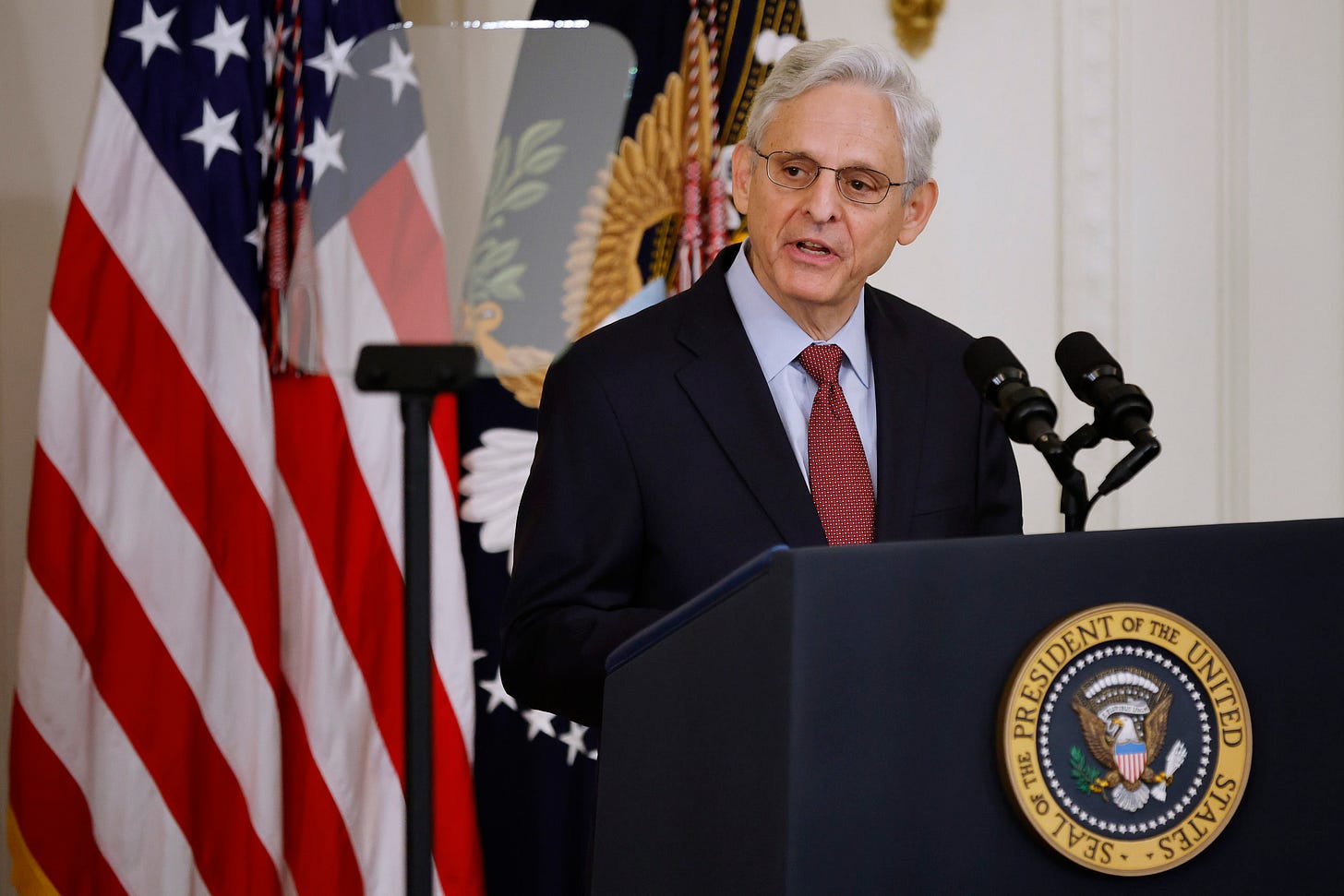Why Hasn’t DOJ Appointed a Special Prosecutor for Jan. 6th?
Merrick Garland can't serve both the White House and Congress.
Why hasn’t Merrick Garland appointed a special prosecutor to handle the January 6th criminal contempt proceedings?
It’s a fair question. In fact, when you break this down, it may be the biggest no-brainer in legal history.
So let’s do that.
There’s no question that Congress has the constitutional authority to conduct investigations and to issue subpoenas. While Congress has an inherent authority to enforce those subpoenas, it also has a statutory right to have its subpoenas enforced through criminal contempt proceedings.
But enforcing the criminal law is an executive branch function. Consequently, when a witness refuses to honor a subpoena and Congress makes a criminal contempt referral, the actual enforcement gets passed to the Department of Justice, which has a legal duty to seek an indictment. All this makes for a tricky separation-of-powers balancing act since it requires the Justice Department to give a full measure of respect to the interests of Congress: "Even when a branch does not arrogate power to itself . . . the separation-of-powers doctrine requires that a branch not impair another in the performance of its constitutional duties."
That full measure of respect is particularly critical just now because criminal contempt may be the only way to enforce these subpoenas in the courts. After the McGahn case, there’s an open question as to whether the House can bring an action for civil contempt at all. Congress could fix this problem simply by passing a law making it clear that the House has the authority to enforce subpoenas in the courts. Unfortunately that’s just one of a long list of critical democratic infrastructure fixes that Congress has been thoroughly ignoring.
So it isn’t permissible for the Department of Justice to refuse to pursue a congressional contempt referral just because the executive branch would prefer that cabinet members and presidential advisors not have to respond to congressional subpoenas. But that is precisely the position the department has taken going back to at least the Truman administration.
The Office of Legal Counsel has produced opinion after opinion concluding that presidential advisors have blanket immunity from congressional subpoenas. These opinions always cite other OLC opinions rather than court cases—because there are no actual court cases supporting the OLC’s position. In fact, there is very little case law in this area at all. In no small part, this is because the Department of Justice refuses to enforce contempt referrals that involve presidential advisors. The few district court cases that do exist (one of them written by a promising young judge named Ketanji Brown Jackson) hold that the OLC is wrong and that presidential advisors are not entitled to absolute immunity from congressional subpoenas.
Which means that when the Department of Justice refuses to enforce a congressional subpoena, they aren’t obeying the law—they are begging the question. They don’t know what the law is and where the correct balance between the congressional duty to investigate and executive privilege lies. They’re simply assuming that the president’s interests outweigh those of Congress.
Which is precisely the conflict the DOJ faces now. The House has referred three Trump aides to the department for criminal contempt: Mark Meadows, Peter Navarro, and Dan Scavino. All three were neck-deep both in Trump’s efforts to overturn the election and in the planning for Trump’s Jan. 6th rally. The Meadows case was sent over last December. So far, the Justice Department has done nothing.
Department of Justice regulations require a special prosecutor be appointed when it is in the public interest to do so and when the “investigation or prosecution . . . would present a conflict of interest for the Department.”
And with respect to these three prosecutions, the Department of Justice is hopelessly conflicted.
There can be no clearer, more fundamental, conflict of interest than the Department of Justice refusing to vindicate—or even test in court—congressional subpoena powers because it considers itself duty-bound to defend the rights of the president rather than the rights of Congress.
And don’t forget the other requirement for appointing a special prosecutor: That doing so is in the public interest. The events of Jan. 6th were the most direct threat to our democracy since the Civil War. Congress must be allowed to investigate them and ensure they never happen again. The House Jan. 6th Committee is entitled to every witness’s evidence and it is imperative that it follows this evidence wherever it leads rather than being detoured by artificial roadblocks set up by the very people with the most to hide.
Unchecked executive privilege risks becoming a demagogue’s charter that shields coup plotters rather than being a tool of good government. So it’s also in the public interest to ensure that executive privilege has well-defined limits that don’t tempt future presidents into abusing the doctrine, something unlikely to happen as long as the Department of Justice refuses to allow these issues to be decided by a court.
An attorney general cannot serve two masters. He can’t act on behalf of both Congress and the executive branch in the same litigation. Even Jeff Sessions respected the rule of law and recognized when a conflict required him to step aside.
Merrick Garland should do the same.


